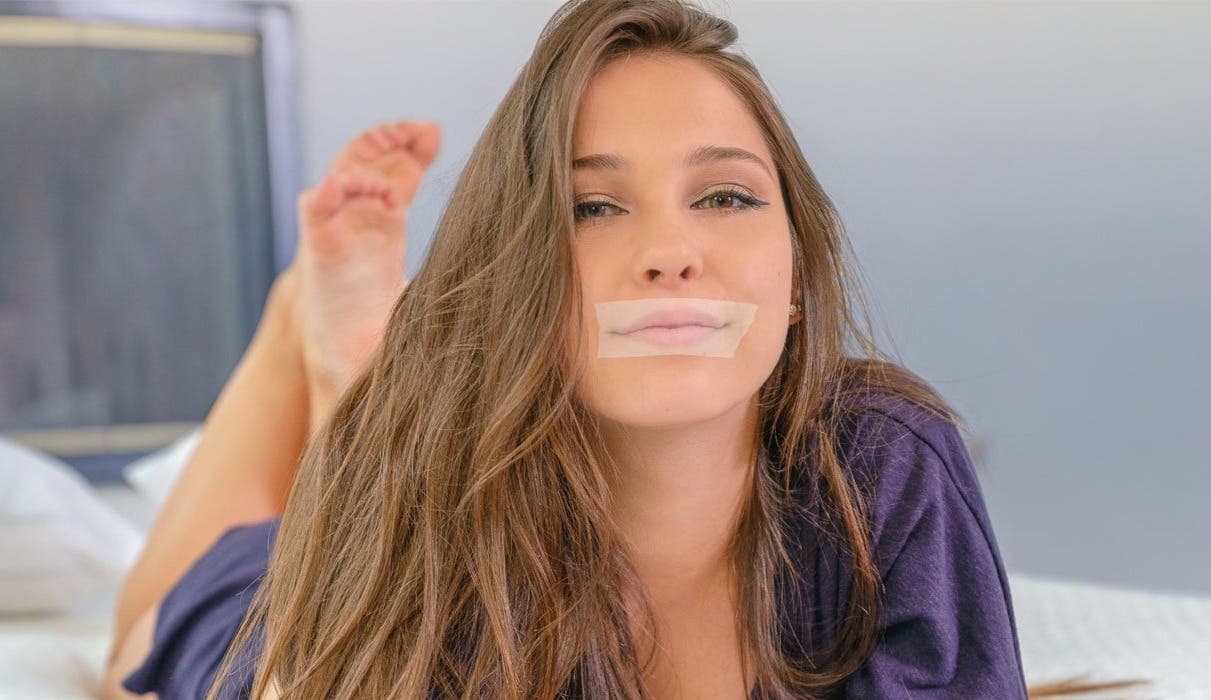Mouth taping can improve quality of sleep and blood oxygen levels
It’s tough to tell your body to breathe through your nose at night, but you can force it to with a trick that’s growing in popularity.

[Jan. 16, 2023: Caitlin Lockerbie]
Medical experts say mouth taping can improve the quality of your sleep and the benefits from that rest. (CREDIT: Creative Commons)
It’s tough to tell your body to breathe through your nose at night, but you can force it to with a trick that’s growing in popularity.
Medical experts say mouth taping can improve the quality of your sleep and the benefits from that rest.
Dr. Hilary Dalton of Dalton Dental says it’s a simple as it sounds: taping your mouth shut. However, how you do that is key.
She suggests using a barrier, like Vaseline, around your lips and then using a porous tape that you’re comfortable with, “they recommend Somnifix but there’s also all kinds you can get at CVS, Walgreens, any of the drug stores or Publix,” she says any kind of surgical or medical tape is fine, just “don’t use duct tape, people!”
The goal is to force nose breathing at night, but you want to be able to easily remove the tape.
Related News
“You’re getting that more moist air versus the mouth,” says Dr. Dalton. She explains, “it actually filters dust and allergens, your mouth doesn’t do that.”
She says, avoiding a dry throat and mouth also leads to better dental health.
“Just think of it logically, going through your mouth is drier. So, when your saliva is the defender, you have good and bad microbiome so the good is protecting the teeth, so when you don’t have it what’s going to be your protection against cavities?”
Studies show other significant health benefits from nose breathing, including increased nitric oxide in the sinuses, which leads to reduced inflammation and improved immune system.
Mouth breathing can lead to high blood pressure and sleep apnea. It also can worsen asthma, and deprive the organs of optimal oxygenation.
Dr. Dalton explains, “according to the studies, you’re getting a 15 percent increase in oxygenation through the nasal passages versus the mouth, which is pretty good."
Dr. Dalton. (CREDIT: Creative Commons)
She says there are some people who should avoid this tactic including those who suffer from allergies or a deviated septum.
“Some kind of narrowing of passages, has a lot of mucosal problems due to allergies…or where you’re really, during the day, you’re standing up and you feel you can’t breathe, I wouldn’t put something on my mouth.”
Alternatives to Mouth Taping
If you are interested in mouth taping but unsure if it’s the right choice for you, consider exploring some alternatives.
Discuss sleep problems with your doctor: Before you start taping your mouth shut for sleep, talk to your health care provider about why you want to use mouth tape. If they suspect OSA, they may recommend a sleep study and a more effective treatment for your concerns, such as medication, lifestyle changes, or CPAP therapy. Let them know if a medication or supplement you are taking is keeping you up at night.
Make an appointment with the dentist: If oral health concerns, like bad breath or gum disease, have you considering mouth tape, pay your dentist a visit. They can determine if mouth breathing, or something else, is the cause of your problems.
Reduce snoring with lifestyle changes: Snoring is not always a sign of sleep apnea. Obesity, alcohol, certain medications, and smoking can all trigger snoring. If you do not have OSA and are thinking of trying mouth tape to stop snoring, consider losing weight, quitting smoking, or cutting back on alcohol instead.
Treat nasal congestion: Respiratory infections and allergies can lead to mouth breathing, especially when left untreated. While over-the-counter medications are helpful for reducing occasional congestion, a health care provider should address chronic or severe respiratory allergies.
Improve your sleep habits: Try adopting better sleep hygiene, or positive sleep-related habits. Get plenty of exercise during the day and maintain a consistent, relaxing bedtime routine at night. Avoid consuming caffeine and alcohol before bed.
For more science and technology stories check out our New Discoveries section at The Brighter Side of News.
Note: Materials provided above by Caitlin Lockerbie. Content may be edited for style and length.
Like these kind of feel good stories? Get the Brighter Side of News' newsletter.



